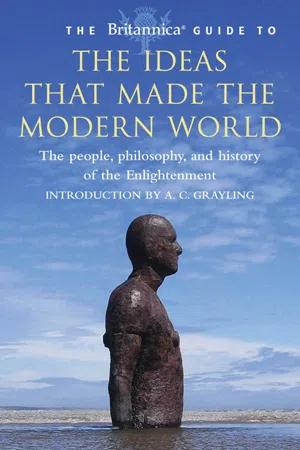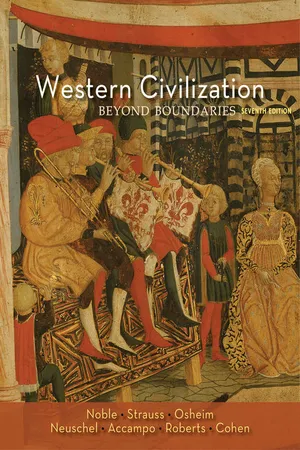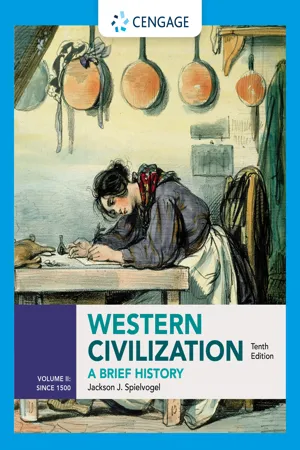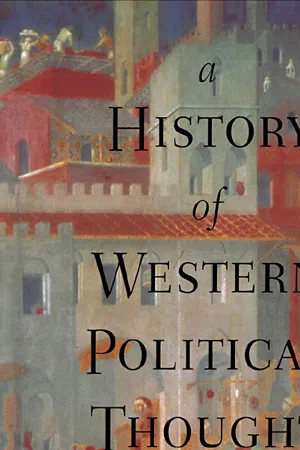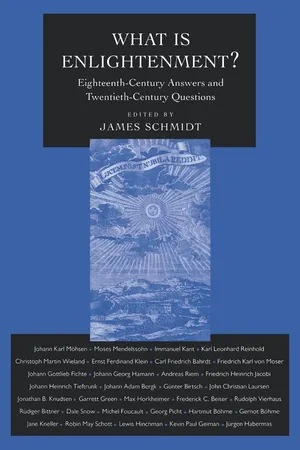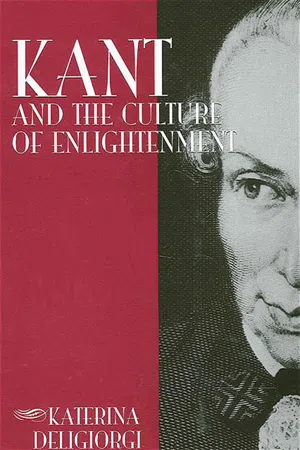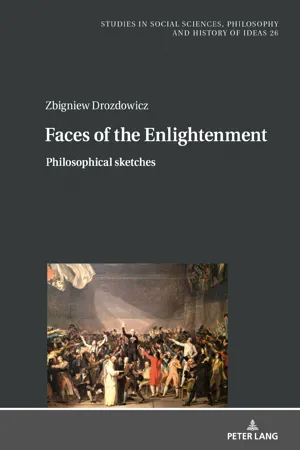History
Enlightenment
The Enlightenment was an intellectual and cultural movement that emerged in Europe during the 18th century. It emphasized reason, individualism, and skepticism, and sought to challenge traditional authority and beliefs. The Enlightenment had a profound impact on politics, science, and philosophy, and helped pave the way for modernity.
Written by Perlego with AI-assistance
Related key terms
1 of 5
9 Key excerpts on "Enlightenment"
- eBook - PDF
- Encyclopaedia Britannica, Inc.(Authors)
- 2008(Publication Date)
- Encyclopaedia Britannica, Inc.(Publisher)
1 A HISTORY OF THE Enlightenment The Enlightenment (in French the Sie Ácle des Lumie Áres ( ``Age of the Enlightened''), in German Aufkla È rung ) swept through Europe in the 17th and 18th centuries. With new ideas con-cerning God, reason, nature, and man, the Enlightenment offered a world view that gained wide assent and instigated revolutionary developments in art, philosophy, and politics. Central to Enlightenment thought were the use and the cele-bration of reason, the power by which man understands the universe and improves his own condition. The goals of ra-tional man were considered to be knowledge, freedom, and happiness. The Enlightenment was both a movement and a state of mind. The term represents a phase in the intellectual history of Europe, but it also serves to define the programmes of reform advocated by influential French writers, philosophers, and scientists, known as ``philosophes'', who were inspired by a common faith in the possibility of a better world. The special significance of the Enlightenment lies in its combination of principle and pragmatism. There are two traditional schools of thought regarding its character and achievements. The first sees the Enlightenment as the preserve of an elite centred on Paris and as primarily a French movement, while the second perceives it as an inter-national phenomenon with as many facets as there were countries affected. Although most modern interpreters incline to the latter view, there is still a case for the French emphasis, given the genius of a number of the philosophes and their associates. Unlike other terms applied by historians ``the Enlightenment'' was used and cherished by those who believed in the power of the mind to liberate and improve. - eBook - PDF
- Eileen Ka-May Cheng(Author)
- 2012(Publication Date)
- Continuum(Publisher)
Finally, while sharing many of the same assumptions about the nature and purpose of history, Mercy Otis Warren went much farther than any of these three historians in challenging the established political order, revealing both the extent of and limits to the radicalism of the Enlightenment. 30 Historiography: An Introductory Guide WHAT IS Enlightenment? The Enlightenment is a term that has been broadly used to describe the intellectual transformations of the eighteenth century, but modern scholars have hotly debated the meaning and character of this transformation, reflecting the differences among Enlightenment thinkers themselves. These differences were such that it might be more accurate to speak of the eight-eenth century as a time of many Enlightenments in the plural, rather than of the Enlightenment as a unified movement. 1 The German philosopher Immanuel Kant offered an influential definition of the Enlightenment in his well-known essay, “What is Enlightenment?” Declaring that for him, Enlightenment was “man’s release from his self-imposed tutelage,” Kant pointed to the belief in human ability and reason that many Enlightenment thinkers shared and that accounted for why they have been grouped together into a movement, when he proclaimed that tutelage was man’s inability to make use of his understanding without direction from another. Self-incurred is this tutelage when its cause lies not in lack of reason but in lack of resolution and courage to use it without direction from another. Sapere aude! “Have courage to use your own reason!”- that is the motto of Enlightenment. Kant thus urged individuals to use their own reason and think for themselves, rather than follow the dictates of tradition and established authority. - eBook - PDF
Western Civilization
Beyond Boundaries
- Thomas F. X. Noble, Barry Strauss, Duane Osheim, Kristen Neuschel(Authors)
- 2013(Publication Date)
- Cengage Learning EMEA(Publisher)
514 Chapter 18 Europe on the Threshold of Modernity, ca. 1715–1789 Profound changes in economic and social life accompanied this revolution in intel- lectual and political spheres. The increasing economic and strategic importance of overseas colonies made them important focal points of international conflict. Economic growth spurred population growth, which in turn stimulated industry and trade. As the century closed, Europe was on the threshold of truly revolutionary changes in politics and production that had their roots in the intellectual, economic, and social ferment of eighteenth-century life. The Enlightenment What were the most important ideas in Enlightenment thought, and what were some of the intellectual, social, and political conditions that favored its development? The Enlightenment was an intellectual movement that brought to political and social questions the confidence in the intelligibility of natural law that Newton and other scientists had recently achieved. Following Descartes and Locke, Enlightenment thinkers believed that human beings could discern and work in concert with the laws of nature for the betterment of human life. Above all, Enlightenment thought gave people the confidence to question tradition. A belief grew that society must be grounded on rational foundations to be determined by humans, not arbitrary foundations determined by tradition and justified by religious authority. Enlightenment thought was debated in increasingly widespread publications, such as newspapers. There were new opportunities for exchanging views in literary societies, salons, and cafés. These new means of sharing information ensured that informed public opinion would become a new force in political and cultural life. Given this broad base, Enlightenment thinking was certain to challenge the very foundations of social and political order. - eBook - PDF
Western Civilization
A Brief History, Volume II since 1500
- Jackson Spielvogel(Author)
- 2019(Publication Date)
- Cengage Learning EMEA(Publisher)
Ironically, at the same time that reason and materialism were beginning to replace faith and worship, a great outburst of religious sensibility manifested itself in music and art. Clearly, the grow- ing secularization of the eighteenth century had not yet captured the hearts and minds of all European intellectuals and artists. 17-1 THE Enlightenment Q Focus Questions: What intellectual developments led to the emergence of the Enlightenment? Who were the leading figures of the Enlightenment, and what were their main contributions? In what type of social environment did the philosophes thrive, and what role did women play in that environment? In 1784, the German philosopher Immanuel Kant (i-MAHN-yoo-el KAHNT) (1724–1804) defined the Enlightenment as “man’s leaving his self-caused immaturity.” Whereas earlier periods had been handi- capped by the inability to “use one’s intelligence with- out the guidance of another,” Kant proclaimed as the motto of the Enlightenment: “Dare to know! Have the courage to use your own intelligence!” The eighteenth- century Enlightenment was a movement of intellectuals who dared to know. They were greatly impressed with the accomplishments of the Scientific Revolution, and when they used the word reason—one of their favorite 390 ■ CHAPTER 17 The Eighteenth Century: An Age of Enlightenment had embarked on voyages of discovery to other parts of the world in the late fifteenth and sixteenth centuries. In the course of the seventeenth century, traders, mis- sionaries, medical practitioners, and explorers began to publish an increasing number of travel books that gave accounts of many different cultures. Then, too, the new geographic adventures of the eighteenth century, especially the discovery in the Pacific of Tahiti, New Zealand, and Australia by the British explorer James Cook, aroused much enthusiasm. Educated Europeans responded to these accounts of lands abroad in differ- ent ways. - eBook - PDF
- J. S. McClelland, Dr J S Mcclelland(Authors)
- 2005(Publication Date)
- Routledge(Publisher)
In his famous essay What is Enlightenment? of 1784, Kant offered a celebrated definition of what it was to be enlightened: to be enlightened was to ‘dare to know’. Kant chose to regard the whole of eighteenth-century thought as a revolt against ignorance and superstition. Knowing was to know the basis of things, how things really worked. Kant’s is a very tempting definition of Enlightenment. It readily brings to mind some of the great intellectual battles of the age. Biblical criticism, for example, began to ask seriously what kind of record of the past the Old and New Testaments actually provided (the measurements of Noah’s ark described a vessel much too small to contain all the animals mentioned in Genesis). In France, there was a battle over the superstitious influence of the Jesuits, especially in education. Voltaire attempted to popularise and spread the teachings of Newtonian physics as the true constitution of the universe (and called his mistress Madame Venus-Newton). One thinks of the tremendous growth of interest in A history of western political thought 284 accounts of other, non-Christian, civilisations like Ancient Egypt, Persia and China, from which the Christian West perhaps had something to learn. Coupled with this concern with other civilisations went a genuine attempt to write ‘philosophical’ history, what we would now call comparative cultural sociology. This was a vast intellectual enterprise designed to show that all societies left to themselves were necessarily bound to go through the same processes of growth, maturity and decline. I say ‘left to themselves’ because an important part of Enlightenment consisted of devising ways in which that apparently ineluctable process of development could in fact be changed into necessary and inevitable progress, and all this without a word from God. Enlightenment also meant an enquiry into the means of knowing itself: what we call epistemology. - eBook - PDF
- James Schmidt(Author)
- 1996(Publication Date)
- University of California Press(Publisher)
Introduction What Is Enlightenment? A Question, Its Context, and Some Consequences James Schmidt The Enlightenment has been blamed for many things. It has been held re-sponsible for the French Revolution, for totalitarianism, and for the view that nature is simply an object to be dominated, manipulated, and ex-ploited. It has also been implicated in one way or another in European imperialism and the most aggressive aspects of capitalism. While some have insisted that its skepticism about absolute values infects our culture with a nihilistic sluggishness, others have suggested that liberal societies should divest themselves of the Enlightenment's obsession with philosophical foun-dations. I It is said that its passion for rights and liberties unleashed a de-structive individualism that undermines any sense of community.2 Yet it has also been argued that its assumption that human nature was infinitely malleable has provided the intellectual inspiration for attempts by total-itarian states to eradIcate all traces of individuality from their subjects. 3 It has been criticized for its insensitivity to the tragic character of moral con-flicts and for its naive assumption that all dilemmas have simple solutions. 4 It has been argued that its attempt to construct a moral philosophy ended in failure, leaving us with either an impoverished moral vision that sup-presses all values that cannot be reduced to instrumental efficiency or a corrupted moral discourse in which ethical evaluations are nothing more than a mask for individual preferences. s It has been castigated for its affec-tion for master metanarratives and its hostility toward otherness.6 Its racism and its sexism have not passed unnoticed. 7 Looking over this list of charges, one wonders how one period could have been responsible for so much and so many different kinds of harm. - eBook - PDF
- Stephen Baxter(Author)
- 2023(Publication Date)
- University of California Press(Publisher)
"The philosophy of the eighteenth century takes up. . . the methodological pattern of Newton's physics .... Reason is now looked upon rather as. . . the original intellectual force which guides the discovery and determination of truth. . .," wrote Cassirer. "The whole eighteenth century understands rea- son in this sense... as a kind of energy, a force .... " " This is how it is that the eighteenth century could claim that theirs was par excellence the Age of Reason. This faith in reason constitutes the eleventh in my enumeration of the characteristics of the French Enlightenment. A twelfth characteristic of the French Enlightenment was its great interest in what amounts to psychology. Instances of this interest were the Abbé Condillac's Essai sur l'origine des connais- sances humaines (1746) and his famous Traité des sensations (1754). Such also were Diderot's Letter on the Blind (1749) and his Letter on the Deaf and Dumb (1751). Also of extreme impor- tance in the history of ideas in the eighteenth century were Hel- vétius' De l'Esprit (1758), which caused a tremendous uproar, and his De l'Homme (1773). These books, in turn, prompted Diderot to write his Réfutation de l'ouvrage d'Helvétius intitulé l'Homme (1773-1774). Now, all of this —all this sensationalistic psychology so charac- teristic of the Enlightenment—stems from John Locke and his Essay Concerning Human Understanding (1690). Locke's work is of course a treatise on metaphysics, on epistemology. But Locke was also a physician, besides being a philosopher, and many of his dicta in the Essay Concerning Human Understanding, as also in his Some Thoughts Concerning Education (1693), depend upon the empirical method and upon actual observation of behavior. Thus, Locke became a kind of intellectual parent of the effort (conspicuous in the French, Italian, and Scottish En- lightenments) to extend the scientific method to social studies and to the study of man. - eBook - PDF
- Katerina Deligiorgi(Author)
- 2012(Publication Date)
- SUNY Press(Publisher)
Indeed, if we are to pay close attention to historical con- text as Klein urges us to do, then we must also acknowledge the present historical context in which Enlightenment becomes a question for us today. This context is informed by the self-image of contemporary Western culture as, for good or ill, the inheritor culture of the Enlightenment. I say “for good or ill” because the value of this inheri- tance is a matter of fierce contestation. In these competing assessments what is presented as philosophically important or worthwhile is set programmatically against a particular diagnosis of our inherited gains and ills. While some authors continue to view Enlightenment as a process of emancipation from the external authority of church and state, and as a discovery of the “inner light” of reason, others focus on the Enlightenment’s “shadows,” identifying destructive consequences that are still felt today. The advanced procedures for the “domination” and “manipulation” of nature that drive contemporary technology are identified as a disastrous result of the emancipatory promise held out 2 INTRODUCTION by enlightened scientific reasoning. 5 The belief that social practices ought to be anchored securely on rational foundations is seen as having contributed to the depletion of vital resources for sustaining the fabric of moral and social life. More specifically, the demand that actions be judged on the basis of abstract and universalist principles is seen as having contributed to a devaluation of local, familial, and communal bonds that can function as the bases of ethical obligations. And con- versely, the failure of Enlightenment thinkers to recognize the diversity of human experience in relation to race, culture, and gender has been causally related to a lack of social and political structures that can respond to the demands of a genuinely pluralistic society. - eBook - PDF
Faces of the Enlightenment
Philosophical sketches
- Zbigniew Drozdowicz(Author)
- 2020(Publication Date)
- Peter Lang Group(Publisher)
One of those correctives is issued in the essay: “What is Enlightenment? (Was ist Aufklärung?)” 116 . In its light: “Enlightenment is man’s emergence from his self-imposed immaturity. Immaturity is the inability to use one understanding without guidance from another. Self-incurred is this tutelage when its cause lies not in lack of understanding (Verstand), but rather of resolve and courage to use it without direction from another. Sapere Aude! Have courage to use your abstract view of the Enlightenment or to ignore its anti-intellectual character, then it would become difficult to admit that the “rational systems” had long been dead and the “Copernican turn” was already under way when Kant entered the scene. In the German conditions, the situation was defined by the struggle between the school of Wolff and his detractors, which somehow forced Kant to belatedly discover anew certain truths that were already cliché for the West-European Enlightenment. Cf. P. Kondylis, Die Aufklärung im Rahmen des neuzeitlichen Rationalismus, op. cit., p. 673 et seq. According to the Polish expert on the philosophy of I. Kant – Marek Siemek – there are elements in Kant’s pre-critical writings which can also be found in the works of such philosophers of the Enlightenment period such as Leibniz or Ch. Wolff: “it is around 1770 that Kant finally realizes the fundamental difference between both major endeavors of this metaphysics, rational ontology and theodicy and his own ideas”. In his general evaluation he states that “although the intellectual horizon of Kant’s philosophy goes well beyond the boundaries of Enlightenment, his philosophy did actually result from the dynamics of the Enlightenment thinking in most of its crucial points.” Cf. M. Siemek, Racjonalizm i naturalizm w filozofii niemieckiego Oświecenia, in Filozofia niemieckiego Oświecenia, op.
Index pages curate the most relevant extracts from our library of academic textbooks. They’ve been created using an in-house natural language model (NLM), each adding context and meaning to key research topics.
